My father never really talked about the motion picture
business |
Read more at in70mm.com The 70mm Newsletter |
| Interviewed at the Empire Cinema in Copenhagen, 3. September 2015. Transcribed for in70mm.com by Brian Guckian, Dublin, Ireland | Date: 24.09.2015 |
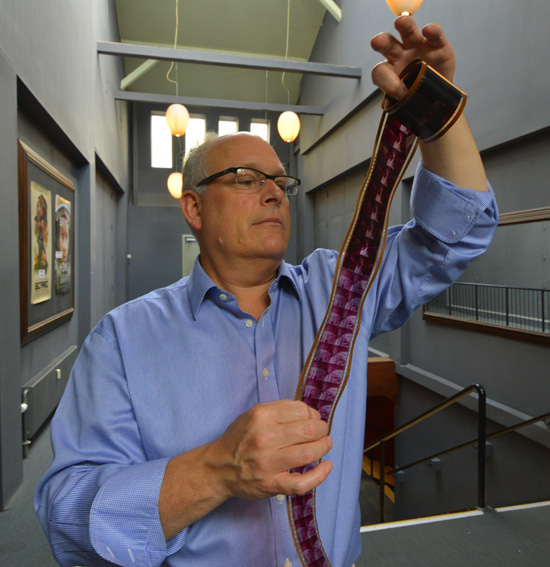 Cyrus Todd
with a piece of the faded 70mm version of "This is Cinerama" in Copenhagen,
3. September 2015. Image by Thomas Hauerslev Cyrus Todd
with a piece of the faded 70mm version of "This is Cinerama" in Copenhagen,
3. September 2015. Image by Thomas HauerslevThomas: Tell me a bit about yourself, your interests, and about your work – what do you do? Cyrus Todd: Now, I do contract and residential sales for A clients in New England, in the United States. I live along the sea coast of New Hampshire, about an hour north of Boston. THa: How many years have you lived there? CT: I’ve lived there for three years; prior to that I lived and raised a family for 25 years in Vermont. And before that, Ireland and New York City. THa: Tell me about your childhood in Westchester – what do you remember about that? CT: I remember a big happy family; large gardens, large house; big dogs - St. Bernards - a lot of good school friends, good small community vibe - only about ten, fifteen miles north of New York City. So it was no problem: often as a family we would go to New York and see shows, or the circus, or the movie theatre, or restaurants. THa: We’ll jump ahead a little bit – what did you think about moving to Ireland? I suppose you were a teenager, when your Dad decided to go? CT: I loved the idea – I know that my father – after my mother passed away when I was sixteen – he was going through a hard time and he needed a change. And he re-married, and he could no longer "store wood" in the same house – it was too hard for him. And they went on a trip to Ireland, and came back and said, “We’ve found this place to rent; it’s a castle, and we’re going to rent a castle in Ireland...we’re moving to Ireland in six weeks”. [Laughs] And I said, “Sure”...I don’t think all my siblings were quite as happy about the idea, but I liked it, and I loved it. THa: How old were you at that time? CT: Seventeen, when we moved. THa: Are you the oldest of the family? CT: I am the oldest, yes. There are six from my father’s first marriage – myself, my sister Susan, my sister Sarah, Demmie and she was the Still Photographer that worked in New York City, probably for about fifteen, maybe eighteen years – she worked on a lot of different movies. Then my sister Eliza, and my brother Daniel who passed away two years ago, and my brother Oliver. And my father re-married, and I’ve two brothers – they both live in Ireland, and their names are Dell and James. I see the lads in Ireland once a year, and I see my brother Oliver, who lives in Denmark, probably once or twice a year – he travels, and we’ve met up in Ireland. He surprised us last Thanksgiving – he flew overnight and drove through a snowstorm to join us for Thanksgiving in New England. Unannounced – so it was quite a surprise - THa: Simply knocking on the door and saying hello – CT: Well actually my son was hosting, so when I showed up at the house there was an odd car in the driveway – I wasn’t sure whose license plate that was, and I walked in the door and there was my brother! [Laughter] THa: How were your teenage years in Ireland...did you enjoy that? CT: Well, I was in Ireland too long – I was there for about two years finishing up High School – they sent me back into Fifth Form: instead of having one year left, when I left the United States I had two years of high school in Ireland. After that I came back to the States and did a year at college - it wasn’t really for me - and then I got started working. |
More in 70mm reading: Letters and Dust Devils. Susan Jane Todd in Conversation Oliver Michael Todd in Conversation The Passing of Oliver Michael Todd Mike Todd Jr.'s "Scent of Mystery" in Smell-O-Vision |
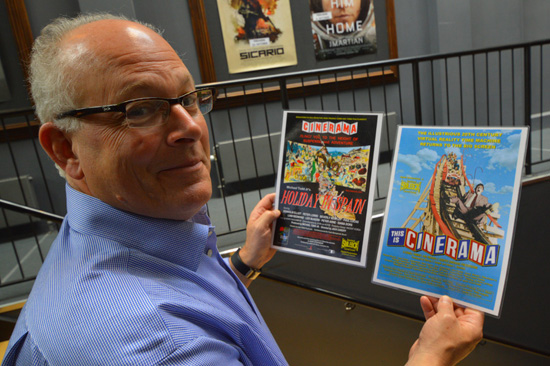 Cyrus Todd in Copenhagen,
3. September 2015. Image by Thomas Hauerslev Cyrus Todd in Copenhagen,
3. September 2015. Image by Thomas HauerslevTHa: What is your line of work? I think you mentioned something about being a chef, or a cook? CT: Well I worked in the motion picture business for about four years in New York, and then I moved back to Ireland and did an apprenticeship and became a chef – I did that for about twenty years. My legs have gotten old and I’m not as quick as I was – and work as a chef is tough – so I decided to find something else. And a friend of a friend said I should get into the appliance business – there was somebody looking for help, and instead of standing behind a stove and cooking, now I stand in front of them and sell them! THa: That’s a nice change! So you were educated in Ireland as a cook? CT: Yes – THa: And worked there as a cook? CT: I did, yes – THa: In Borris, or in Dublin? CT: I worked in Dublin; I worked on the west coast; I worked in Kilkenny, in the south-east, and in New Ross where they have cruising restaurants. So I spent five seasons on the galley cruising restaurants going up and down the Rivers Barrow, Nore and Suir. THa: Jumping ahead a little bit, when and how did you learn that your Dad was a celebrity movie person? At some point you must have realised there was an interesting movie background? CT: I would say – my father never really talked about the motion picture business or show business much, unless he was with friends. Some people certainly came to the house who were famous...but I would say probably ten, eleven, something like that – I knew that my father knew famous people. He grew up in Chicago, and for a number of years every summer we made a trip to Chicago. And because of his father - there used to be a Michael Todd Theatre in Chicago – taxicab drivers and hotel people would always ask my father for his autograph. And my father would be shaking his head: “I’m the least famous person ever for anybody to ask for an autograph!” [Laughs] But he had the same name – so... THa: What do you remember about – you said he didn’t talk about it much, but he did some very famous sequences in "This is Cinerama" – did he ever talk about the work his father did on "This is Cinerama"? CT: I think he may have – it’s when the bunch of us kids got older that we’d listen to the stories, or hear some of the stories. And then when he started to write the book about his father, we’d hear a lot of the stories. We’d hear some show business talk – he was good buddies with Denholm Elliott, who came to the house three or four times a year – and Fritz Weaver – we’d hear some stories. THa: Do you remember any of them? CT: I don’t – no. I was too busy running around kicking a soccer ball, or whatever I was up to! |
|
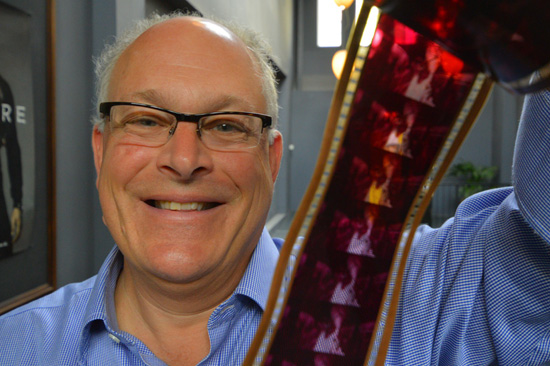 Cyrus Todd in Copenhagen,
3. September 2015. Image by Thomas Hauerslev Cyrus Todd in Copenhagen,
3. September 2015. Image by Thomas HauerslevTHa: Do you remember seeing "Oklahoma!", "80 Days", "This is Cinerama" or "Scent of Mystery"? CT: I have, but the only thing that I can remember is when "Around the World in 80 Days" got re-issued and there was a big premiere – I remember all of us kids getting all dressed up and going to it. I remember we were in Chicago at the Premiere – I think it was the Premiere in Chicago – I know my father was furious because the film skipped, and they lost about a two- or three-minute sequence of the train scene with the Indians – Cantiflas running up and down, ducking the arrows and running along the rooftop – THa: Did your father own the Michael Todd Cinema – the Cine Stage in Chicago? CT: He was – he probably still owned it at that time and then sold it. Tha: So your whole family went to see "80 Days"? CT: We did, yes – THa: What do you think about the film? CT: I think it’s a great movie - it’s a little dated nowadays, but for it’s time I can see why it was a blockbuster. There were a lot of new ideas that were put into it that other people copied. THa: You have worked in the film industry: was that an ambition of yours? CT: I don’t think I really thought about it – I ended up – my father put me up with a friend of his, who said that there was work on this movie thing, and I ended up showing up – Production Assistant, on a movie that I first worked on – "Saturday Night Fever". And it was quite an experience. Tha: Tell me about that, please - CT: A lot of screaming girls - screaming and shouting for John Travolta – the streets of Brooklyn were crazy. Girls shouting, and throwing underwear! So we did a lot of crowd control, and also helped the Location Scout – I was his kind of right-hand man. I got sent out to find a few different sites, and co-ordinated a bunch of stuff with him – they never gave the Production Assistants end credit, but I did get a credit on the film – I can prove I was on the film because there’s a scene where the car crashes into the rival gang’s hideout, and when they were getting the scene ready the Set Director was spraying graffiti onto the building, and I said, “Hey, could you put my initials up there?” So there’s a big “C-C-T” – you see it before the car crashes there! [Laughter] THa: Any other funny anecdotes from "Saturday Night Fever"? CT: I do remember being at the Odyssey 2001 discotheque where we spent about two weeks filming, and the place got clouded with all kinds of frankincense to create the atmosphere – and one of my jobs was to run across the street to where there was a – I don’t know if it was a deserted warehouse, or whether it was some sort of building that wasn’t being used for anything else – and that’s where we kept all the background and all the extras. So my job was to go out and gather them and bring them in. And I do remember that Fran Drescher was one of the extras on that – and I can hear her voice right now – it hasn’t changed from then to now! THa: How many years did you work in the movie industry? CT: About four years. I worked on "Kramer vs. Kramer", and a bunch of projects that people wouldn’t necessarily recognise: "Atlantic City", "The Greek Tycoon"...in New York, Gérard Depardieu made a movie with Claude Lelouche called "The Ins and The Outs". I did the location scouting on that. And there was a movie called "Simon" that had Alan Arkin in it. |
|
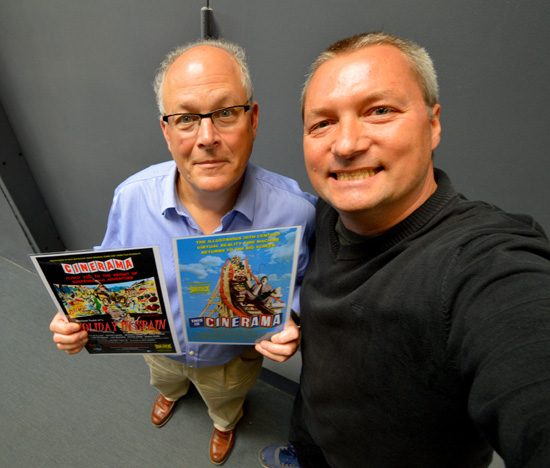 Cyrus Todd
and the interviewer in Copenhagen,
3. September 2015. Image by Thomas Hauerslev Cyrus Todd
and the interviewer in Copenhagen,
3. September 2015. Image by Thomas HauerslevTHa: I think "Kramer vs. Kramer" must be the second one of the very famous films from the period – at least. What was your job on the film? CT: Production Assistant – again, crowd control. Dustin Hoffman is, as I’m sure you are aware, a Method Actor, so there’s a scene in "Kramer vs. Kramer" where the little boy falls off of a play set, or a swing set or something, and hurts himself – whether it’s a broken arm, or whatever – I can’t remember what it was supposed to be – and Central Park in New York City on the East Side is right along Fifth Avenue. There’s a hospital called Lenox Hill Hospital, which was about four blocks away on Lexington – and the script had Dustin Hoffman scooping up his son, running through traffic and down to the hospital, delivering him to the Emergency Ward. So Dustin Hoffman had the idea that he was going to do the whole thing, like a Method Actor naturally...I think he made it about a block and a half! [Laughter] And then they cut and made it look the way it would do. But I was standing on 64th or 65th Street – the corner of Central Park – and standing with the policeman. And my job was to stop traffic – we would get the cue that Dustin Hoffman had the kid in his arms – I think his name was Justin Henry – and was ready to run across the street. And I would tell the policemen to stop traffic, here they come. So there were two very nice older ladies, who were walking up on the sidewalk on our side, and they approached us and I said, “Do you mind waiting here for a second? We’re just about to film a scene in the movie”. And they said, “Oh, what’s the movie?” And I said, “Kramer vs. Kramer”. They said, “Oh I’ve never heard of that – who’s in it?” And I said, “Well, Dustin Hoffman”. And they said, “Oh, can we stay and watch?” I said, “Sure, of course you can”. One – two – three beats later, a huge stretch limousine pulls right up screeching to a halt, right in front of us, and out of the limousine hops Al Pacino [Laughter] – and he runs straight into the building standing next to him, and he’s gone. And the ladies say to me, “There’s Dustin Hoffman!” And I was about to say something, and then the cue comes – “Cyrus, stop the traffic”. So I asked the policeman to stop the traffic, and then Dustin Hoffman comes running across the three lanes of Fifth Avenue. And he’s gone, and the ladies say “Wow, that’s Al Pacino!” [Laugher] On "Kramer vs. Kramer" it was summertime when we filmed, and then part of the movie is Christmas time – one particular scene was being filmed – a Christmas party in an office. And it was summertime, and we ran way over time filming in this office building on the thirtieth floor somewhere on Third Avenue, and the air conditioning went off at 7 o’clock in the evening, or whatever. So we’re there until 11 o’clock in the evening, and they’re trying to get this scene – the final scene, where they’re waving goodbye or something, at the Christmas party – and everyone is hot, no-one’s happy, it looks nothing like a joyous occasion, for a Christmas party, and Dustin Hoffman goes up to Robert Benton (who was the Writer and the Director) and says, “Hey Bob, I’ve got an idea – if it works, it’s great – I’m going to tell one joke, and I just want you to have the cameras roll – I think it’ll liven up the thing and we can get through this one minute thing and then we can all finally go home”. So he says, “Sure, go for it Dustin”. So Dustin Hoffman explains what I just did to all the set crew, and everybody says, “OK, sure, whatever” – everybody’s mumbling and grumbling; nobody’s happy. So Dustin Hoffman gets up, and he says to everybody, “OK, how do you masturbate a dinosaur?” One – two – three beats – and then he runs with his arms like this! [Gestures] And everybody laughs, and the occasion lifted up, we got our take, and we all got to go home. Of course the movie that I didn’t mention was the one that my father produced, called "The Bell Jar", which unfortunately just didn’t quite click...that was a big learning experience for me. THa: Tell us about "The Bell Jar", because there’s not a lot of information about the film, anywhere - CT: Well, it’s a very depressing book, but very popular – Sylvia Plath’s book – and it was an interesting movie to work on – we had an Art Director, John Lloyd, who was very famous, and a Director, Larry Peerce – his father, Jan Peerce, was a famous opera singer. But Larry and John really didn’t hit it off very well, and there was sort of competing interests in...who was trying to one-up the other in terms of set decoration, colour schemes – you could see where making a motion picture is trying to herd a whole bunch of cats together and get everyone to co-operate. The movie itself wasn’t bad; there were a couple of mistakes in it, but overall it was about as good a thing you could do on a depressing subject. I don’t want to run it into the ground, but it just didn’t hit with the audience that I think liked the book. So it opened and closed very quickly. |
|
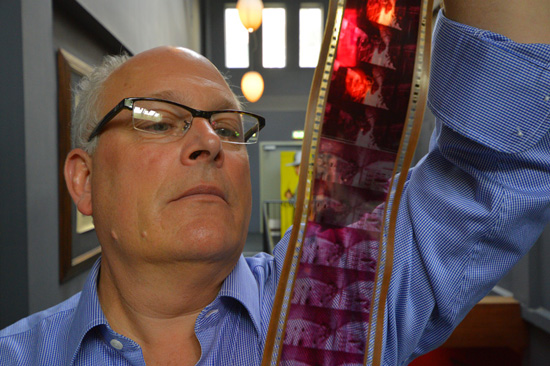 Cyrus Todd
examines
a piece of the faded 70mm version of "This is Cinerama"
in Copenhagen,
3. September 2015. Image by Thomas Hauerslev Cyrus Todd
examines
a piece of the faded 70mm version of "This is Cinerama"
in Copenhagen,
3. September 2015. Image by Thomas HauerslevTHa: It’s interesting about your Dad that he didn’t do anything in movies for ten years or so, and suddenly, by the end of the ‘70s, he turns his attention to producing a film again – what do you think of that? CT: Well, he was very well respected and loved by everybody in show business because of his father, and everybody knew my father as a really nice, smart guy. A cut-throat producer? No – he was not that. But there were a couple of guys who said, “You know there’s this kid, he bought the rights to this film "The Bell Jar" – we don’t really like it, but the book has sold whatever million copies and is popular – maybe you should talk to him”. And so they talked and I think they went through about four or five scripts before they got one they were happy with – I can’t remember who wrote it. And they went and shopped it, and got financing. So – the restaurant business is like the movie business – a lot of movies made, and a lot of restaurants open – very few of them are big hits, but you can have a mediocre hit and still do quite well. THa: What happened to the movie, do you think? CT: I have no idea – the finance company, Avco, had the rights to it, but I’ve never seen it on DVD, or on late night TV, re-runs, whatever. They probably lost too much money and just decided to burn the prints – I don’t know! [Laughs] THa: Did your Todd name opened any doors for you – CT: Well, my father knew people, so I got my first job, and then from that I won’t say I was a known entity, but I could call people and they would not just instantly hang up the phone. And because I worked on two or three projects that were sort of big name things, I was able to continue with work. THa: Was it around four years in New York? CT: Correct – "Saturday Night Fever" was ’76, ’77 – something like that. I moved back to Ireland in 1981. It just wasn’t my thing. THa: When I prepared for the interview with Oliver, eighteen months ago, I googled Mike Todd, Jr. and it came up with the story with the Oscars – we have to have the story with the Oscars – what happened – because your name turns up! CT: Oh yeah...well my brother-in-law got a message to my father saying, “You know those Oscars that you have sitting on your mantelpiece – people are paying crazy money for them!” And at that stage my father probably needed extra money, so he shipped them off, with my new bride, to the United States, where we had moved to, and there was an auctioneer in California named Malcolm Willits, who was auctioning off different things. He had all kinds of show business, Hollywood memorabilia, and he said he’d be delighted to auction off the Oscars. So we sent them out to him, and then he advertised it big that he had these Oscars – for "Around the World in 80 Days" – that he was auctioning. And the Academy took a dim view of it – I guess starting in the late 1940s they made everyone sign a release that when they received their Oscar, if they didn’t want it the Academy would take it back and give them one dollar for it. But they were not allowed to sell it, or do anything else with it. So they got a court injunction to stop the auction, and the Oscars came back to me, and then they went back to my father. |
|
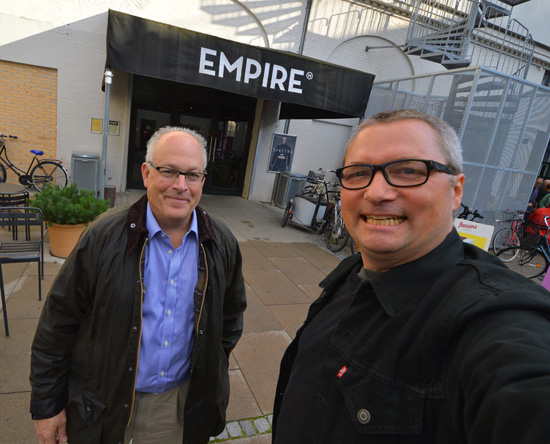 Cyrus Todd
and the interviewer outside the EMPIRE cinema in Copenhagen,
3. September 2015. Image by Thomas Hauerslev Cyrus Todd
and the interviewer outside the EMPIRE cinema in Copenhagen,
3. September 2015. Image by Thomas HauerslevTHa: But I suppose your Granddad did sign for them? CT: He did, yes. Previous to that, they were just handed out. I wasn’t going to spend the money to fight it and drag it out! That was my father’s thing. THa: Oliver mentioned that – because one of the questions was, “When did you realise your father was a celebrity, and he realised it because he thought at least seven Oscars, or six, or five – CT: Five – five – THa: - five – they’re not normal to have in a household! Then he started to think about, “My Dad is not the usual Dad - with these on the mantelpiece!” CT: Right – Well I realised it when we went to the World’s Fair in New York, and instead of having to wait in line we just went straight up to whatever show or ride we wanted to go to. My father had a show at the 1964 World’s Fair called "Stand Up America" – a sort of musical review. THa: That more or less concludes my line of questions, but I’ll ask you, as I asked Susan and Oliver, if you have anything to add...that you think is important to put on paper – regarding yourself, your Dad – or the history? CT: Well, I do know that my father was very proud of his father – and thought he was probably one of the most amazing people that ever walked the face of the earth. If you read my father’s book, A Valuable Property, the first couple of pages outline that he was a unique character that bridged an era, and was able to just pick up and do whatever he wanted to do and make things happen. Which is a very difficult thing to do. The other thing is, he was better at – my Grandfather this is, according to my father – better than anyone else he ever met in his life who could not look over his shoulder – just keep going forward. And my father passed on to me, probably the most important thing that I can think of, that anybody could pass on to anybody, and hopefully I’ve done it with my children, is to be a good person, but [also] to be able to figure out how to enjoy life. So you can laugh, know how to have fun. Because there’s so many people walking around that haven’t figured that part out – they might have more than anybody else, yet they’re still not happy. |
|
| Go: back - top - back issues - news index Updated 22-01-25 |
